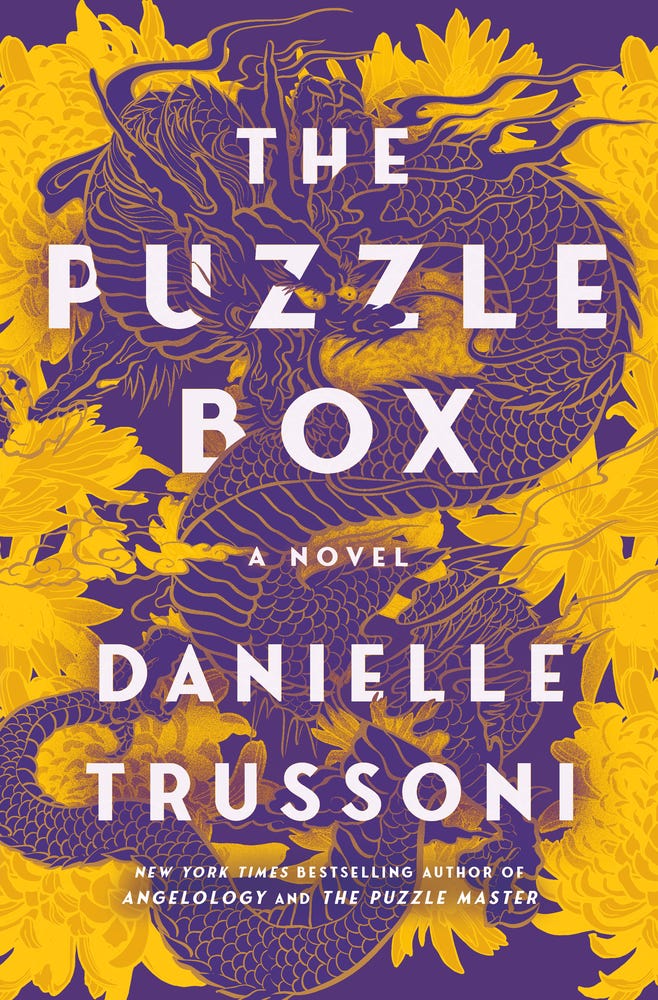"This idea had been simmering for decades"
New York Times bestseller Danielle Trussoni on working with professional puzzle makers, falling in love with her protagonist, and her deftly plotted new thriller, THE PUZZLE BOX
Check out the collection of past Words With (Author) Friends, wherein I g-chat with an author and you get to read over my shoulder, and order Danielle’s new up-all-night bestseller, out now.
Me: Danielle, hello!
Danielle: Hey! I'm here finally 🙂
Hello! Yay! Welcome!
Huge congrats on The Puzzle Box! How are you feeling post-launch?
I'm going to grab a coffee and be right back. I just got out of a meeting so a bit breathless but back in five
Okay! No problem
To leave a question waiting for you while you grab a pick-me-up—I'm on your website to nab your bio for the post, and did I know you're from La Crosse? I'm from Milwaukee!
I think Wisconsin produces a disproportionately high number of thriller writers
Hi, I'm back!
Yes, I agree—all that snow and ice!!
+ the long winters and the midwestern ability to read anyone through their stiff upper lip, lol
TOTALLY! the unreadability of it all
I think that that writing requires a certain amount of pain tolerance and growing up in the way that I did in the midwest without a lot of the literary accoutrements that some of my writer-friends had as kids has made me a better writer.
Ooh interesting, say more! What do you mean by "a lot of the literary accoutrements that some of my writer-friends had as kids"?
My first book was a memoir about growing up in Wisconsin with my father, who was a Vietnam vet and specifically a tunnel rat (solders who were assigned to go deep underground to fight in tunnels). My first vision of the world was that it was cold, difficult, inscrutable and war-like (I know that sounds really fabulous!). My lifeline was the public library, where I found all varieties of fantastical creatures, adventures, and (through reading) could come to understand the world a bit. Many of my writer friends grew up without that sense of difficulty. I've found that they grew up with more temperate weather, but with expectations of college and careers... not so for me!
So interesting! I practically lived at the library as a kid too. I was soooo interested in other worlds (real and fantastical) when my suburb felt sort of quiet and stifling.
By that I mean that some (not all of course) of the writers I've met grew up around people who were writing or were highly educated (professors or lawyers, etc), and did not come from a working class background in the way that I did. For me, books and writing were pure rebellion
Oh, I LOVE that. On that note, let's get into THE PUZZLE BOX—for those who aren't already unfamiliar, can you share what it's about?
The short version is that THE PUZZLE BOX is the story of an ingenious puzzle solver who is called by the Imperial Family of Japan to open the most difficult, dangerous puzzle of his life: the Dragon Box, a 19th century puzzle box that holds secrets that could change the nature of Japan. His attempts to solve it send him on a breakneck race through contemporary Japan, and bring startling realizations about the nature of his extraordinary gift.
I know you lived in Japan at one point, and your thrillers often have puzzles as a motif. Can you share how you came up with this particular story?
I lived in Japan for two years as a high school English teacher in a village called Yoshii-machi in Fukuoka prefectures in Kyushu, on the southern-most island Japan. I applied for a job teaching English through the JET program, a program run by the Japanese government that placed native English speakers in Japanese schools so that students would have a chance to hear English on a regular basis. I loved it the minute I arrived and wanted to write about Japan ever since. I was fascinated by the culture, and when I created the character of Mike Brink (the ingenious puzzle solver/ savant) in THE PUZZLE MASTER, I realized that I could finally take that experience and run with it.
Of course, being inspired by a place and then transforming that inspiration into a novel is another thing entirely. Perhaps because this idea had been simmering for decades, when the elements came together—the character of Mike Brink, an ingenious puzzle solver, and a Japanese puzzle box as his greatest challenge—the story solidified fast. I wrote out a paragraph description and from that expanded it into an outline. Remarkably, the idea for the novel and the published book are very much of a piece. I’ve written novels in the past that are wildly different from the first idea, but this one seemed to be fully formed in my mind.
I love that! I often think of good thrillers having a puzzle-box structure, but you literally centered this around a puzzle box. I'm guessing you're quite good at puzzles yourself and had some fun putting this plot (and its eponymous puzzle box) together?
Keep reading with a 7-day free trial
Subscribe to Andrea Bartz: Get It Write to keep reading this post and get 7 days of free access to the full post archives.



